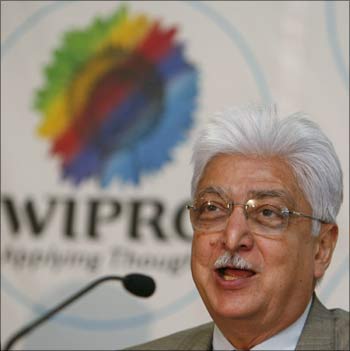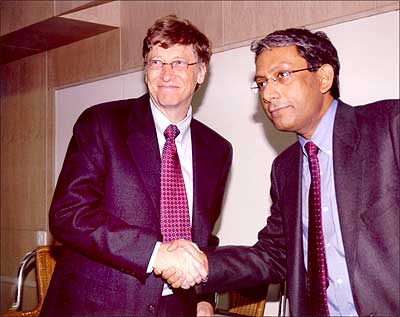Photographs: Reuters Shivani Shinde in Mumbai
Blame it on improved business climate, restructuring within companies or just the basic need to pursue better opportunities -- the Indian information technology industry is seeing heavy churn at the top.
Some recent exits that have grabbed the headlines include Ravi Venkatesan of Microsoft, Bhaskar Pramanik, Oracle India head, Debashis Chatterjee, Cognizant's BFSI head, Ashok Soota, co-founder and chairman, MindTree, Avinash Vashishta of Tholons, and the two CEOs of Wipro, Girish Paranjpe and Suresh Vaswani.
"We have noticed an increase in the demand for senior-level people. In the last six to eight months, the demand has gone up by 60-80 per cent for profiles like vice-president for large organisations, chief operating officers and CEOs for mid-sized companies, and even vertical heads," said James Agarwal, consulting director and head, BTI Consultants, the executive search division of Kelly Services.
Industry analysts and HR experts say that rarely do people at such high positions move out only for fatter pay packets. The reasons vary with individuals.
. . .
Why top Indian IT whizkids are changing jobs
Photographs: Reuters
According to Ganesh Shermon, head of People and Change at KPMG India: "Top-level managers or CEOs quit for three reasons. First, a mismatch between what is expected of them and what is being delivered. Second, professional disagreements. The issue, then, is of autonomy. And finally, personal reasons, such as better compensation, a more challenging job, cultural issues, etc."
A point in case is the Wipro CEOs. It is a well-known fact that the dual-CEO model did not work for the company. So chairman Azim Premji dismantled it.
In some MNCs like Microsoft, it's a case of global restructuring, whose impact is felt in other geographies too.
. . .
Why top Indian IT whizkids are changing jobs
Photographs: Reuters
For all MNCs, India is an important growth market. "They need people who can manage this growth," said Diptarup Chakraborti, a former analyst with research and advisory firm Gartner. Globally, Microsoft has seen eight high-profile exits since 2008.
HR experts say the sector has seen such high churn in the past too. They say it will continue, as the industry is still growing at a fast pace. In 2008, a set of top executives left Wipro.
For instance, P R Chandrasekar, heading the US and Europe businesses, joined Hexaware. Soon, Sudip Nandy quit to join Aricent. The reasons were personal and they continued in the industry with much more challenging work. The same was the case with Oracle India, which saw en masse resignations at the top.
. . .
Why top Indian IT whizkids are changing jobs
Photographs: Reuters
The other reason is India's fast growth, which creates enough prospects for talented people. For example, the outgoing CEOs of Wipro will have no dearth of assignments.
"We have been hearing that the venture capital industry is keen to get both on board. There are also rumours that Ravi Venkatesan may start his own fund," a senior marketing professional with a leading IT firm said on condition of anonymity.
Agrees Jessie Paul, managing director, Paul Writer. "The industry is also undergoing change. To be ready to accept this, it needs new talent. From an employer's point of view, if a person delivering 40 per cent growth year-on-year suddenly drops his productivity, it's a huge issue," she added.
. . .
Why top Indian IT whizkids are changing jobs
Photographs: Reuters
A senior HR head of an IT company who did not wish to be quoted said at times these moves took everyone by surprise due to lack of a proper succession plan. "Within the industry, other than Tata Sons and Infosys, no one has a clear succession plan," he said.
For some, like the former high-profile boss of Wirpo, Vivek Paul, it was entirely a personal decision, as he moved out to join the risk finance space, first with buyout private equity fund TPG, but eventually turned entrepreneur with Kinetic Glue.
Similar was the story with Rajiv Kaul. The former head of Microsoft India relocated to London with private equity fund Actis but later took an entrepreneurial bet by joining hands with Blackstone and taking over the helm of CMS Info Systems.








article